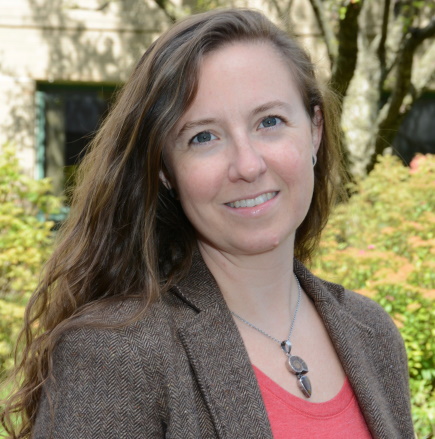SSW doctoral student awarded distinguished fellowship renewal
One of Caitlin Cassady’s high school mentors told her “I wish you wanted to be a teacher. I think you’d be really good.” But early in her undergraduate studies at Wayne State University, Cassady set her sights on being a social worker, so she could change the world. Once she got bitten by the “teaching bug” while teaching at WSU’s School of Social Work, though, her mentor’s prophecy became a reality.
 “I realized how influential, important, and fun teaching could be,” said Cassady, a second cohort of the Social Work and Anthropology (SWAN) PhD program. SWAN is an innovative trans-disciplinary doctoral degree in social work and anthropology. Informed by its location in Detroit, the program focuses on urban issues, both national and global, providing training in the skills, content and theory of both disciplines.
“I realized how influential, important, and fun teaching could be,” said Cassady, a second cohort of the Social Work and Anthropology (SWAN) PhD program. SWAN is an innovative trans-disciplinary doctoral degree in social work and anthropology. Informed by its location in Detroit, the program focuses on urban issues, both national and global, providing training in the skills, content and theory of both disciplines.
Recently, Cassady was awarded a renewal of her King-Chávez-Parks Future Faculty Fellowship (KCP-FFF) Program, including a stipend of $18,300 for the 2022-2023 academic year. She was awarded the same fellowship in 2021. One of the stipulations of the fellowship is that recipients must obtain and serve in a postsecondary faculty teaching position for up to three years.
The program was created by the Michigan Legislature to curb the downward spiral of college graduation rates for students underrepresented in postsecondary education.
After earning her Master of Social Work from WSU in 2008, Cassady practiced as a clinical social worker in home health, hospice, emergency and intensive care units, and oncology. She returned to fulltime doctoral study in 2015. Cassady is particularly interested in studying how individuals, families, and clinicians navigate choice, ethics, and morality at the end of life.
“The most rewarding part of my area of study is that it applies to all people. Death happens in our lives and then to us. It is as certain as birth. What motivates me is seeing how unnecessarily hard it is for so many. Studying systemic and cultural barriers, helping people cope with them, and shedding light on these issues, is monumentally important in society,” said Cassady.
Several professors at WSU influenced her career path, including Andrea Sankar, her Anthropology advisor, and Faith Hopp, an associate professor and Hartford Geriatric Social Work Faculty Scholar.
“Ms. Cassady has a well-established track record of academic and scholarly excellence as a student in our SWAN program. She has a strong and consistent focus on palliative and end-of-life care, based on several years of clinical practice as an MSW-level social worker. Her dissertation work, which focuses on issues related to Medical Aid in Dying (MAiD), builds on her depth of practice expertise in the field that informs her innovative scholarship,” said Hopp.
“The ethnography Caitlin is conducting will both provide a detailed and nuanced account of the practice as well as serve as an instructive text for clinicians working with the dying. As one of the first students to be accepted into SWAN, I look forward to her synthesis of anthropology and social work in addressing this increasingly important issue,” said Sankar.
“Dr. Sankar and Dr. Hopp have championed me beyond all others. Dr. Hopp has supported and advised me longer than anyone else in my professional career,” said Cassady.
Cassady hopes her research will produce valuable information on how prevalent biases and interpretations of ethical principles impact other areas of care or groups seeking non-normative deaths.
Through her teaching and studies at WSU, Cassady has learned to work harder to help struggling students and be more flexible to give them better chances to succeed. And while teaching during the pandemic was challenging, it helped her hone her teaching skills.
“I think it has made be a better teacher…maybe just the teacher my mentor knew I could be so long ago,” she said.
Five years from now, Cassady sees herself teaching.
“I hope to be writing and teaching future health practitioners. It’s important to me to bring anthropology to bear on health issues and practice. I think it has the potential to vastly improve policy and care in our country and beyond.”